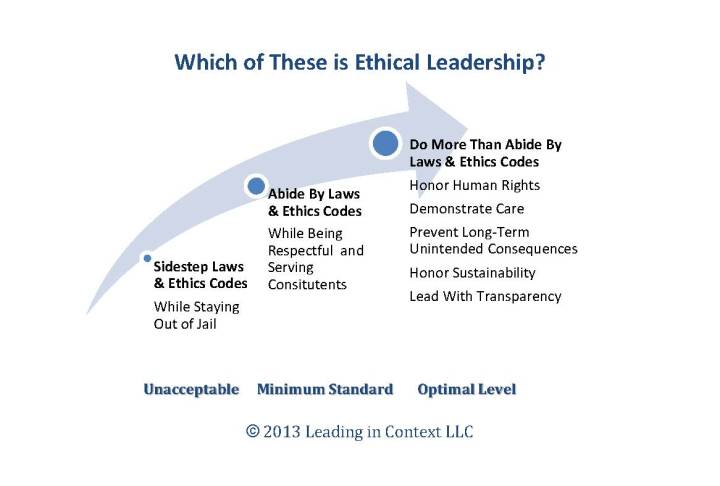By Linda Fisher Thornton
“Do Laws Set the Standard For Ethics?” may be a simple question, but the answer is complicated. They do and they don’t set the standard.
Laws set the MINIMUM standard for ethical behavior. This is the level that I call the punishment threshold. If your behavior drops below this level, you will be fined, sanctioned, sent to jail, or otherwise punished. The reason there are punishments when laws are violated is because they are considered the rock bottom of what we should be able to expect from people. Obviously, we don’t want everyone behaving at this level.

Ethical values set the OPTIMAL standard for ethical behavior. They define the desired behaviors – what we want people to do. Applying ethical values requires a broad understanding of our responsibilities and a willingness to take responsibility for our role in the workplace and society.
No one should use “following laws” as a measure of their good citizenship. It’s ethical values that are the true measure of leaders and organizations.
![]()
Learn How to Apply all 7 Ethical Dimensions of Leadership
Includes how ethical expectations are increasing, and what you can do to stay ahead of the curve.
Click the cover to read a free preview!
Unleash the Positive Power of Ethical Leadership®
©2017 Leading in Context LLC


Reblogged this on Gr8fullsoul.
LikeLike
Thank you for sharing your continuum and underscoring the important point that legal does not equal ethical!
LikeLike
Linda,
Laws are the minimum standard of legality and they are certainly important in defining that which is illegal.
The Moral Continuum developed by Archie Carroll and Ann Buchholtz in their excellent book identified that which was Moral, Amoral, and Immoral. Kim Cameron and David Whetten expanded that framework and suggested that the categories should be Virtuous, Amoral, and Immoral. My colleagues and I have integrated those ideas to incorporate a Virtuous Continuum that identifies Virtuous, Moral, Amoral, and Immoral ethical choices — with Moral choices being positive contributors and behavior clearly under the ethical umbrella but Virtuous choices being those which optimized ethical duties to all stakeholders and the creation of long-term wealth.
That which is legal falls, most typically, in the Amoral category — although that which is legal may also be Immoral, despite its legality. We know many examples of such a standard, of course.
ENRON was the marvelous example of “the smartest guys in the room” who hired FASB auditors to ensure that their actions were inside the letter of the law, even when their accounting machinations violated the purpose and intent of all reasonable accounting standards. They were always legal but nonetheless profoundly immoral, self-serving, and corrupt.
Thanks for addressing this vital issue!
Cam Caldwell
LikeLike